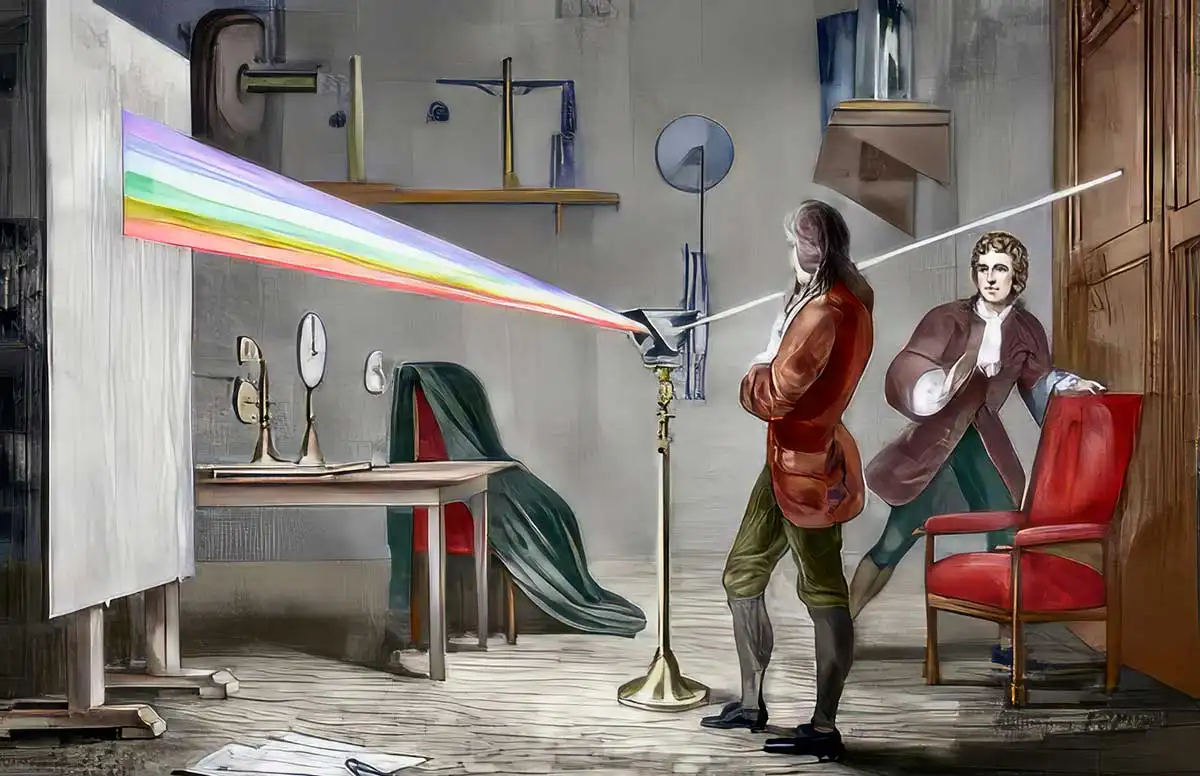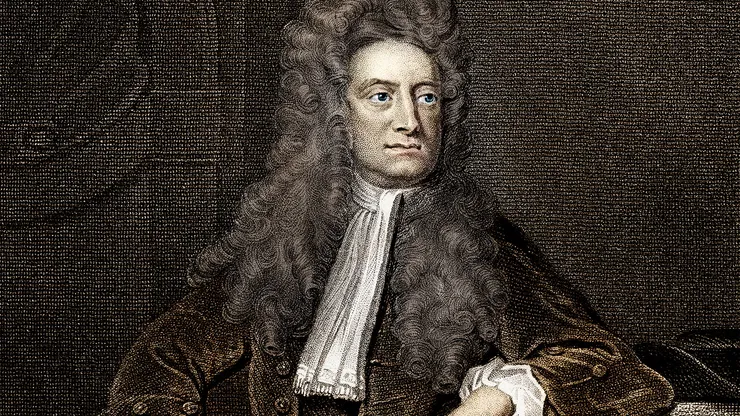Isaac Newton’s Achievements and Fascinating Anecdotes
The Life of Isaac Newton
Isaac Newton, a giant in the fields of physics and the history of science, is a figure filled with remarkable achievements and intriguing stories. Let’s delve into his life and explore his extraordinary contributions.
Early Life and Education
Isaac Newton, one of the most influential scientists in history, was born on January 4, 1643, in Woolsthorpe, England. His early years, although uneventful, laid the foundation for his remarkable intellectual achievements. At the age of 14, Newton’s brilliance caught the attention of his teachers when he enrolled at Ulster Grammar School. Despite facing financial constraints that prevented him from attending Cambridge University, Newton’s determination and thirst for knowledge led him on a path toward an uncertain but promising future filled with discoveries and groundbreaking contributions to the field of science.
Transformation from Alchemist to Scientist
In his early years, Newton dabbled in alchemy, a mystical pursuit of turning base metals into gold. Alchemists of the time conducted numerous experiments and rituals in an attempt to uncover the secrets of chemistry and transmutation. Newton, fascinated by the alchemical arts, embarked on his own journey of experimentation and exploration. He spent countless hours in his laboratory, meticulously blending and heating various substances, hoping to unlock the elusive secrets of the philosopher’s stone. However, as time went on, Newton began to realize the inherent limitations and impracticality of alchemy. While he appreciated the symbolic nature of alchemical teachings, he recognized that true scientific breakthroughs required a more systematic and empirical approach. This realization prompted Newton to shift his focus towards rigorous scientific research, ultimately leading him to formulate his laws of motion and universal gravitation. Thus, Newton’s early foray into alchemy served as a stepping stone in his intellectual development, guiding him towards the realm of scientific inquiry and discovery.
Discovering the Law of Gravity
One of the most significant and groundbreaking achievements in the field of physics is attributed to Sir Isaac Newton, who is renowned for his remarkable discovery of the law of gravity. This revolutionary theory put forth by Newton proposes that every single object present in the vast expanse of the universe possesses an inherent ability to exert a force of attraction upon every other object. Furthermore, this force of attraction is directly proportional to the product of their respective masses and inversely proportional to the square of the distance between them. This profound principle, commonly referred to as “Newton’s Law of Universal Gravitation,” is elegantly expressed by the equation: F = G * (m1 * m2) / r^2. It is worth noting that this fundamental law not only serves as the cornerstone of modern physics but also plays a pivotal role in numerous practical applications, including the precise calculation of the intricate orbits of artificial satellites and accurate prediction of the celestial motions governing our planetary system.
Analysis of Light and Wave Theory
Newton dedicated a substantial amount of time to the in-depth study and exploration of light. With great curiosity and scientific rigor, he engaged in numerous experiments aimed at unraveling the mysteries of light. One of his groundbreaking experiments involved the splitting of light into its constituent colors, thereby revealing what we now know as the light spectrum. This groundbreaking discovery revolutionized our understanding of light and paved the way for the development of modern optics. Newton’s profound insights and observations on the nature of light can be found extensively detailed in his renowned work entitled “Opticks.”
Newton’s Infinite Series
Newton’s contributions to mathematics were incredibly significant. He revolutionized the field by introducing groundbreaking techniques for approximating complex functions with simple infinite series. These infinite series, which he meticulously developed, not only became a cornerstone of calculus but also had a profound impact on the entire realm of mathematics. Newton’s work on infinite series has not only stood the test of time but continues to be widely utilized in various engineering and scientific disciplines. In fact, it has become an integral part of modern computer algorithms, showcasing the enduring relevance and practicality of his mathematical innovations.
Newtonian Mechanics and Celestial Dynamics
Newton’s laws of motion, formulated by Sir Isaac Newton in the 17th century, had a profound impact on celestial dynamics. Prior to Newton’s revolutionary theories, the motion of celestial bodies was poorly understood. However, with the introduction of his “Newtonian mechanics,” a new era of understanding began.
Newton’s laws of motion provided a comprehensive explanation and accurate predictions of the motion of celestial bodies. This breakthrough in astronomy led to a paradigm shift, where scientists and astronomers had a new framework to study and comprehend the workings of the cosmos.
Not only did Newton’s laws of motion revolutionize celestial dynamics, but they also had a significant influence on our everyday lives. The principles outlined in his laws are not limited to celestial bodies but are applicable to objects in our daily routines. Whether it is the motion of a ball thrown in a game or the movement of vehicles on the road, Newton’s laws of motion continue to shape and guide our understanding of the physical world.
In summary, Newton’s laws of motion brought about a monumental shift in our understanding of celestial dynamics. These laws, which continue to remain relevant today, have not only changed the field of astronomy but have also left an indelible mark on our daily lives.

Academic Career and Recognition
Isaac Newton, a brilliant physicist and mathematician, dedicated a significant portion of his life to the pursuit of knowledge and academic excellence at the renowned University of Cambridge. During his time there, he immersed himself in a multitude of subjects, expanding his intellectual horizons and honing his expertise. His remarkable achievements led to his prestigious election as a Fellow of the Royal Society, a highly esteemed recognition of his scholarly contributions.
At the University of Cambridge, Newton actively participated in scientific discourse, presenting numerous groundbreaking scientific papers and engaging in thought-provoking intellectual discussions with his peers. His profound insights and innovative theories revolutionized the scientific landscape, forever altering our understanding of the natural world.
Newton’s legacy is nothing short of extraordinary. His discoveries and laws, such as the laws of motion and the law of universal gravitation, have profoundly impacted the scientific community. They continue to serve as the foundation for countless scientific advancements and form the basis for our current understanding of the physical universe.
In summary, Isaac Newton’s academic journey at the University of Cambridge not only enriched his own knowledge and experience but also left an indelible mark on the scientific community. His immense contributions and groundbreaking theories continue to inspire generations of scientists, ensuring his enduring legacy in the annals of scientific history.
Engaging Anecdotes
Let’s explore some captivating anecdotes from Isaac Newton’s life:
Under the Apple Tree: Discovery of Gravity
One of the most famous stories in the history of science is the tale of Sir Isaac Newton observing an apple falling from a tree. According to legend, this seemingly ordinary event sparked a profound thought in Newton’s mind, leading him to contemplate the concept of gravity. It is said that this pivotal moment became the starting point of his extensive research on gravity and serves as a remarkable testament to the incredible power of keen observation. By carefully observing the motion of a falling apple, Newton unlocked the secrets of the universe and forever changed our understanding of the fundamental forces that govern the world we live in.
The Controversial Calculus Clash
Newton found himself embroiled in a highly contentious and widely debated dispute, famously known as the “Calculus Priority Dispute,” with the renowned German mathematician Gottfried Wilhelm Leibniz. This dispute, which centered around the invention and priority of calculus, a crucial and fundamental branch of mathematics, had a profound and lasting impact on the subsequent development and evolution of modern calculus as a discipline. The intense and protracted nature of the disagreement further fueled the significance of this historical event, making it a subject of great scholarly interest and analysis even to this day.
Struggles with Alcoholism and Illness
Despite his remarkable scientific achievements, Newton faced personal challenges. In addition to his groundbreaking discoveries, he also grappled with internal struggles. Newton’s battle with alcoholism was a constant obstacle, and his health was further complicated by neurological disorders. However, even with these hurdles, Newton remained determined in his pursuit of scientific knowledge and continued to make significant contributions to the world of science.
Conclusion
Isaac Newton’s legacy is deeply intertwined with his groundbreaking discoveries, which have revolutionized our understanding of the natural world. His most famous contribution, the law of gravity, laid the foundation for our understanding of how objects interact with one another. But Newton’s brilliance extended far beyond gravity. His work in optics helped us understand the nature of light and paved the way for advancements in modern optics and photography. In mathematics, Newton developed calculus, a powerful tool that has found applications in various fields, including physics, engineering, and economics. In mechanics, he formulated the three laws of motion, providing a framework for understanding the behavior of objects in motion. These remarkable achievements alone would secure Newton’s place in history, but his life story is equally captivating. From his humble beginnings to his rise as one of the greatest scientific minds of all time, Newton’s journey is filled with fascinating anecdotes that reveal his genius and humanity. His insatiable curiosity and relentless pursuit of knowledge continue to inspire generations of scientists and thinkers worldwide. Today, we owe much of our modern science and technology to Newton’s pioneering work, as his contributions have had a profound and enduring impact on our understanding of the world.







